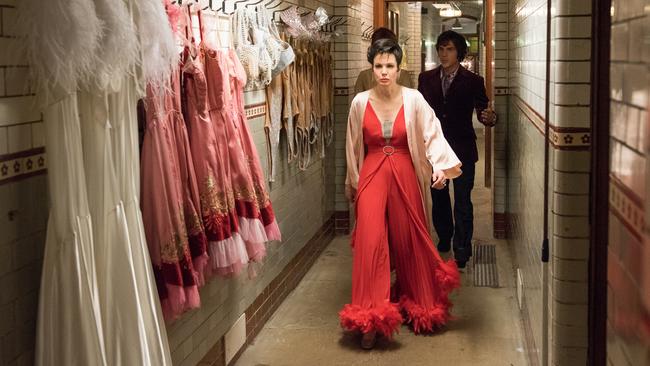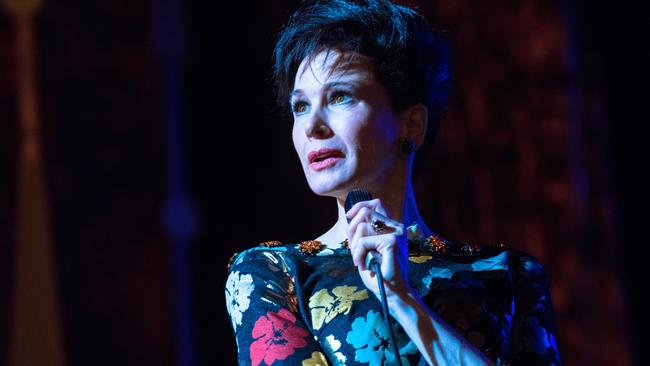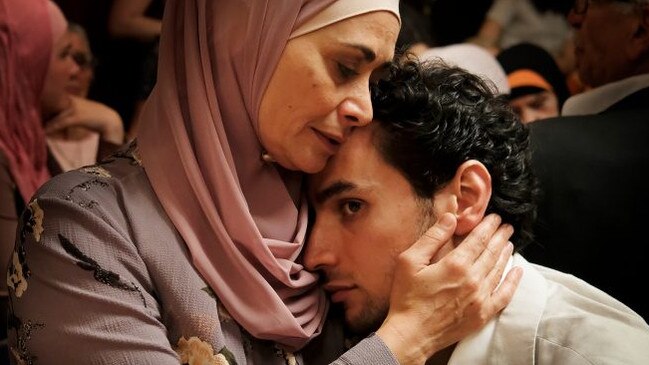Zellweger gets to heart of troubled Judy Garland
As the unreliable star, Renee Zellweger sings the immortal songs herself, and when she grabs the mic, it’s a truly great moment.

Judy is the second film to be released in our cinemas this year in which British impresario Bernard Delfont hands a lifeline to declining American superstar entertainers. Hard on the heels of the delightful Stan & Ollie, in which Delfont (Rufus Jones) books the ageing comedy duo Laurel and Hardy into English music halls in 1953, comes Judy, which is mainly set in 1969, by which time Delfont (Michael Gambon) has become the proud owner of London nightclub/restaurant The Talk of the Town and takes the not inconsiderable risk of booking the notoriously unreliable Judy Garland (Renee Zellweger) as his star attraction.
By the end of the 60s, Garland was a mess. She had been prone to substance abuse since, as a child (played by Darci Shaw) on the MGM lot, she’d been forced to take pills to control her weight and to give her the stamina to act for long hours in front of the unforgiving cameras. Married and divorced four times, her career as a movie star was pretty much behind her — she had starred in her last movie, I Could Go On Singing, a British production, six years earlier — and American cabarets and clubs were cautious about hiring a fading star who was known to be unreliable.

So when the call comes from Delfont she leaves her younger children with her third husband, Sid Luft (Rufus Sewell), and travels to the UK where she’s feted, accommodated in a suite in a smart hotel, assigned a protective minder, Rosalyn (Jessie Buckley), and given star billing in a show boasting lavish production values.
But her demons still haunt her. On some nights she’s wonderful, almost as good as she was in her prime, and the audience loves her. On other nights she’s late, she’s drunk, she’s stoned, she can’t perform — and as a result she is pilloried and humiliated.
Zellweger, who has been costumed and made up to look uncannily like Garland in her later years, is magnificent in the role. When Judy Davis (also excellent) played Garland in the two-part miniseries, Life with Judy Garland: Me and My Shadows (2001), she mimed to Garland’s own original recordings. Zellweger sings the immortal songs herself, and when she grabs the mic and performs the heart-rending lament, By Myself, it’s a truly great moment. Other Garland favourites performed by Zellweger include The Trolley Song, Come Rain or Come Shine and, inevitably and wonderfully, Over the Rainbow, which she describes as “a song about hope”.
Tom Edge’s screenplay is adapted from Peter Quilter’s Tony-nominated stage play, End of the Rainbow. The film cuts back and forth between London in 1969 and Hollywood in 1939 during the filming of The Wizard of Oz when 16-year-old Judy was bullied by Mayer and his underlings and where she developed an unrequited love for Mickey Rooney. In London she takes up with another Mickey, Mickey Deans (Finn Wittrock), who is much younger than she is and who she marries. It’s a tumultuous relationship. One night, in a surprisingly touching sequence, Garland befriends a couple of gay fans and accompanies them to their home for an impromptu dinner of scrambled eggs.
Garland was many things: a larger-than-life entertainer, a gay icon, a tragic figure destroyed by the Hollywood studio system. As Zellweger so convincingly portrays her, she’s an unhappy woman in desperate need of people to love her. When the audience cheers her, she’s on top of the world; when they boo her, the pain on her face tells its own sad story. Garland must have been exasperating to work with, but Zellweger’s performance goes right to the heart of what made her a superstar.
Judy (M) ★★★★
Wide national release
-
Clashing cultures the new Australia
If ever a film reflected Australia’s multicultural reality it’s Slam, which was written and directed by Indian-born, Sydney-based Partho Sen-Gupta (his third feature after two made in India) and that tells a timely and provocative story of complicated race relations.
In the opening sequence, Ameena Nasser (Danielle Horvat), wearing a hijab and looking down the eye of the camera, reads a very beautiful poem she has written.
She’s “performing” in a Slam poetry reading, and when she finishes her read she goes outside the hall onto the suburban street and smokes a cigarette.
Ameena does not come home that night, and her mother, Rana (Darina Al Joundi), with whom she lives, becomes concerned for her daughter’s safety. Ameena’s brother, Tariq (Adam Bacri), has moved away from his Muslim upbringing. He has changed his name to Ricky and is married to Sally (Rebecca Breeds), who comes from a traditional middle-class Aussie family; they have one child, and Sally is pregnant with their second.

When Rana calls her son in the middle of the night to seek his help, Tariq makes a rather ineffectual attempt to locate his sister, who is not answering her phone, and then contacts the police. Senior Constable Joanna Hendricks (Rachael Blake), who has personal problems of her own, takes the case. The search for Ameena leads nowhere at first until Hendricks comes across suggestions that she might have become radicalised. A journalist (Nicholas Hope), employed by the Daily Telegraph, writes a story that suggests she has flown to Turkey to join ISIS, and all hell breaks loose.
Slam is a finely crafted thriller with strong political undertones. It taps into a society in which the threat of terrorism and fear of the unknown is undermining relationships and even families. This is a world where white Australian men drive a car through ethnically diverse suburbs sporting a “F..k off! We’re full” sticker. The film is very critical of the way in which some journalists cover this sort of story and is a reminder of how confronting the media pack can be when it confronts innocent family members.
Sen-Gupta ratchets up the suspense and teases fine performances from every member of a cast that includes the late Damian Hill as Shane, Hendricks’s ex-husband. Given the film achieves so much on what was surely a limited budget, it’s perhaps a bit churlish to complain about the pacing, which at times is a little slow. Overall, Slam is very impressive: it tells an important story in a convincing and enthralling way.
Slam (MA15+) ★★★★
Limited release
-
Damian Hill also crops up in Locusts, the third film directed by Heath Davis after Broke and Book Week. Filmed around Broken Hill, the film is a thriller set in a small (fictional) outback community. Ryan (Ben Geurins) drives from Sydney to Serenity Crossing to attend the funeral of his father. He’s been away a long time and reconnecting with his brother, Tyson (Nathaniel Dean), who lives in a caravan, and his ex-girlfriend, Isabella (Jessica McNamee), proves to be awkward. Worst of all, Ryan falls foul of a bunch of local thugs who claim his father owed them $100,000 and demand he repay them.
Angus Watts’s screenplay, after an intriguing set-up, becomes increasingly improbable as the film proceeds as Ryan plots with Jessica to rob a local nightclub, the Sidewinder, where drugs are plentiful and gorgeous hookers hang out. There’s also an environmental subplot.
Some talented actors are involved — including Andy McPhee as Ryan’s friend — and Davis does his best to bring cohesion to the material, though the wobbly camerawork is, as always, an unnecessary distraction.
Locusts (MA15+) ★★½
Limited release



